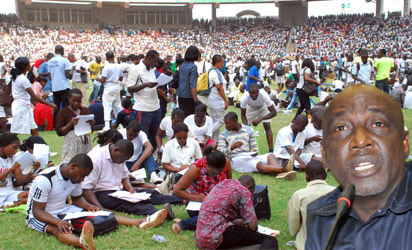Boko Haram has done much damage to Nigeria, so much so that all the money earned by the federal government would not be enough to rebuild what the group has destroyed so far. Yet, terrorism poses little danger to Nigeria’s existence as one united country. Nor does MASSOB (Movement for the Actualisation of the Sovereign State of Biafra) or IPOB (Indigenous People of Biafra) in the south-east and south-south. Though Boko Haram is violent while MASSOB is not, Nigeria’s unity is not threatened by either group because they don’t represent the wishes and aspirations of the majority of Nigerians.
The real threat to the country is a revolution now building up in people’s stomachs. Goodluck Jonathan and the PDP lost power this year to this emerging revolution. Almost everyone was fed up with the blatant looting of the nation’s resources with impunity. In the face of danger confronting the nation’s economy, the ousted regime appeared clueless even as it continued to build false hopes. And time came for most Nigerians to listen to the gospel of change.
I’m aware that important residents of Aso Villa are not allowed to read newspapers or listen to the news on radio and TV. Their attention is drawn only to articles that please lobbyists who work through presidential aides. But shortly before President Buhari moved into Aso Villa, I had cause to advise that he should monitor the true state of the country he governs through newspapers, online and offline. It is a lesson Jonathan learned only after leaving office.
Five months have passed since President Buhari made his inaugural speech, and seven months have passed since he won the presidential election. The honeymoon will be over very soon, if it’s not over already. After all, Gen. Murtala Muhammed made his mark within six months. At this time in 1999, the governor of my home state had finished developing his village.
I know it’s not the president’s fault. At the time he took over, Nigeria was already on its knees. If he had taken steps similar to Murtala’s by now, however, he would have won plaudits. The National Assembly does not qualify as an obstacle. My prayer is that the ministers and personal aides he has assembled should be ready to tell him the truth and not what they want him to hear.
And the obvious truth today? It is that saving the poor has become an emergency. Over 120 million Nigerians are now unemployed or underemployed. Poverty and hopelessness now live in the hearts and minds of most Nigerians. How much longer can they cope?
Let’s hope the ministers would be sworn in by the second or third week of November. During the first FEC meeting, I expect some of them to tell the president that the Nigerian economy is choking very fast. The steps the new administration has taken so far appear good, but you can’t seize all the money in the country (except salaries paid to less than 1 per cent of the population) and expect economic prosperity. No, it doesn’t work like that. One post-World War II leader urged his compatriots to create jobs, even if it meant one set of people digging pits and another set filling them up. The leader understood that the bottom-line of all microeconomic and macroeconomic policies is provision of the people’s welfare: jobs for providing good food, clean water, decent homes, good health, and security. President Buhari should not believe the official lie that the unemployment rate is 24 per cent; it is in the region of 85 per cent.
The situation is precarious in a country where almost everyone depends on government money. No rich Nigerian exists who did not make his money from government. It is money made from government that is employed in the so-called private sector. No calamity could be worse than government failing to spend money during a recession.
So, while the president fights corruption, he should note that it is a major – the largest — industry in the country that is being closed up. Corrupt people are employers and “philanthropists” who spend money. For fear of being exposed or arrested, they have been more interested in hiding their loot than in spending money. And what have been the implications? Millions of people thrown out of jobs. Millions of hungry stomachs. Millions of desperate people. These have unhappy relationships with the rate of crime and other social disorders.
By now, a substantial part of the alleged $150billion stolen by officials of the past regime ought to have entered the public kitty. Many looters ought to have been thrown into jail and their personal assets confiscated. Perhaps doing these will take time. But how much time? Certainly not four years. Scientists say that an average human being can live for no more than 45 days without food. See why people’s patience is running out?
–By ANIEBO NWAMU
#











